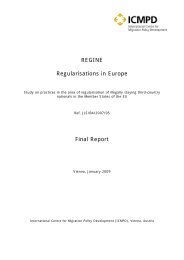taxud/2414/08 - European Commission - Europa
taxud/2414/08 - European Commission - Europa
taxud/2414/08 - European Commission - Europa
Create successful ePaper yourself
Turn your PDF publications into a flip-book with our unique Google optimized e-Paper software.
In the case of Equity SWAPS these are services where the underlying asset is a stock, a<br />
basket of stocks, or a stock index. Compared to actually owning the stock, in this case<br />
there is no obligation to pay anything up front, but there are also no voting or other rights<br />
that stock holders do have. A total return swap is a swap in which party A pays the total<br />
return of an asset, and party B makes periodic interest payments. The total return is the<br />
capital gain or loss, plus any interest or dividend payments. If the total return is negative,<br />
then party A receives this amount from party B. The parties have exposure to the return<br />
of the underlying stock or index, without having to hold the underlying assets. The profit<br />
or loss of party B is the same for him as actually owning the underlying asset.<br />
Total return swap (also known as total rate of return swap, or TRORS) is a contract in<br />
which one party receives interest payments on a reference asset plus any capital gains<br />
and losses over the payment period, while the other receives a specified fixed or floating<br />
cash flow unrelated to the credit worthiness of the reference asset, especially where the<br />
payments are based on the same notional amount. The reference asset may be any asset,<br />
index, or basket of assets. The TRORS, then, allows one party to derive the economic<br />
benefit of owning an asset without putting that asset on its balance sheet, and allows the<br />
other (which does retain that asset on its balance sheet) to buy protection against a<br />
potential decline in its value;<br />
(3) the issuance of tradable debt derivatives, including interest rate swaps;<br />
These are services supplying a financial contract whose payoffs over a period of time are<br />
derived from the performance of one or more tradable debt contracts. This performance<br />
can determine both, the amount and the timing of the payoffs; these payoffs can be in<br />
cash or in becoming the debtor or the creditor of the underlying securities, currency<br />
exchange contracts, deposits, credits or insurances; such services include the supply of<br />
commodity derivatives and indices derivatives which are not excluded by the Regulation;<br />
(4) performance measurement, rating, prediction and control of securities;<br />
Performance measurement, prediction and control of securities are essentially services<br />
for managing the investment risk involved in the supply of securities; they determine the<br />
quality of a security over a specified period in time and determine its market value and –<br />
possibly – its share in an investment portfolio; it is an essential element of supplying a<br />
security and it relates to securities only. It also allows optimising investments by<br />
eliminating less performing securities from the portfolio and replacing them by acquiring<br />
better performing securities. We think that these elements reflect the specific and<br />
essential character of an exempt supply of a security. (Some lawyers in the <strong>Commission</strong>'s<br />
Legal Service were sceptic about this approach.)<br />
(5) arrangement and monitoring of transactions under the security agreement,<br />
including possible voting rights.<br />
Such services enable the client to exercise his rights in the company or association in<br />
which he holds an equity share; they change the legal situation by reducing the legal<br />
liability of the supplier and establish the financial situation.<br />
54
















